
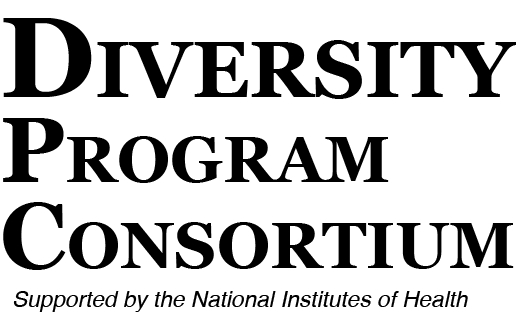


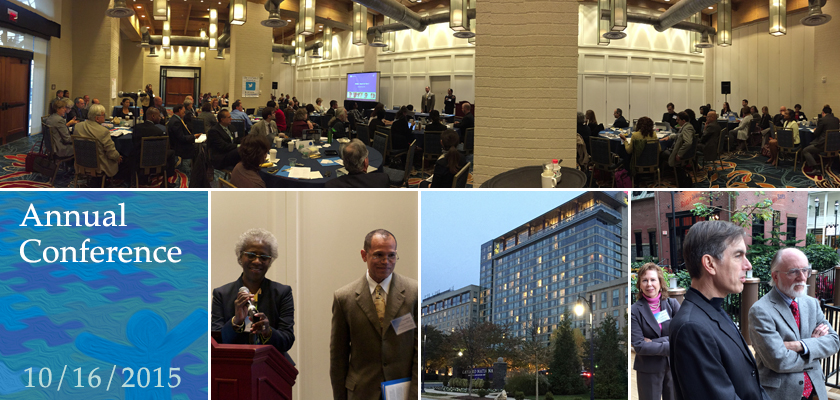
By April L. Vise
"You can throw any curve balls at us, but you have to wait until we learn how to play baseball," University of Texas at El Paso student Jose Perez said at the first annual BUILDING SCHOLARS Consortium Meeting. Of course Perez, a sophomore, wasn't literally referring to the sport of baseball but of the learning curve when conducting research for the first time. Perez was one of seven BUILD student panelists who provided feedback on BUILD activities during the October 9 meeting. The entire BUILDing SCHOLARS network, composed of UTEP BUILD PIs, representatives from pipeline and research partner institutions, and more than 50 BUILD students, assembled throughout the day to collaboratively review and plan the upcoming year of BUILD activities-particularly the BUILDing SCHOLARS Summer Research Program.
The 10-week research-intensive program places students at either UTEP or at a research partner institution during the summer to collaborate with health research experts in one of seven areas of biomedicine, including addiction, cancer, degenerative and chronic diseases, environmental health, health disparities, infectious diseases, and translational biomedicine. "We got to voice our opinions and concerns and it felt like they were accepted very well. It felt like they [partner institutions] really wanted to hear everything we had to say and really analyzed it and asked questions if they didn't quite understand what we were saying," said panelist Hope Cervantes, an electrical engineering freshman minoring in biomedical engineering.
The panel also allowed for students to express their apprehension about the "unknowns" of the summer research program and about leaving El Paso - a first for many.
"This is my first year of college. I didn't leave home, I stayed here at UTEP. I've never really left my family or been alone for a long period of time," Cervantes said. Lauren Chacon, a freshman majoring in kinesiology also voiced her concern about going away for the summer. "I love my family and I'm really connected to them, so leaving is going to be difficult."Many of those concerns were eased, however, when representatives from the BUILD research partner institutions gave short presentations on their undergraduate summer research programs and then met one-on-one with students during the afternoon information session.
"The afternoon session really helped with some of the fears that I have about leaving El Paso this summer. They [partner institutions] talked about most of the concerns that we all had and reassured us that we weren't going alone. They each had their own program and were really passionate about them, which reassures me about the summer research programs," Cervantes said.
This spring, UTEP BUILD students will be matched with faculty mentors at research partner institutions based on mutual research interests and skills through the Chronus© online mentoring platform. Students are then required to complete one to three summers of research based on their academic classification.
"You have been exposed to a wide array of possibilities . . . None of us faculty here ever had those choices in our lives, Dr. Lourdes Echegoyen, director of UTEP's Campus Office of Undergraduate Research Initiatives and BUILD PI, explained to the students. "What you have in front of you is just an amazing opportunity for growth-and we want you to grow. We want you to take advantage of that."
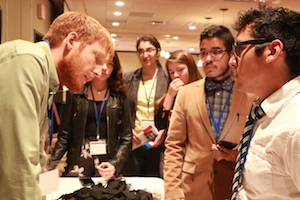
Photo: Dr. Louis Brown (left), representing research partner institution UT Health Science Center at Houston, meets with UTEP BUILD students during the afternoon information session on Oct. 9. Photo by Alejandro Miramontes
Morgan State University's 20 ASCEND Scholars attended the 2015 ABRCMS conference held November 11th-15thin Seattle, Washington. The student scholars were supported by Dr. Jocelyn Turner-Musa (Student Training Core Director), Dr. Cleo Hughes-Darden (Student Training Core Co-Director), Dr. Christine Hohmann (Research Enrichment Core Director), and Mrs. Acquanette Pinchback (ASCEND Program Coordinator).
The ASCEND Scholars participated in daily professional development sessions, where they learned how to write abstracts, write personal statements, and more. They also attended daily scientific talks, viewed other students' poster presentations, networked with scores of summer research and graduate training programs, and completed daily ASCEND-specific assignments.
Another great opportunity was the BUILD social session, where the ASCEND Scholars met other BUILD students from California State University Long Beach and Xavier University of Louisiana; our students liked their programs' t-shirts, and their students appreciated our students' business cards. The students have established ways to continue communicating beyond the conference. In future years, some of the Scholars will submit abstracts to present their own research.
Summing up all of the ASCEND Scholars experiences at the conference, one Scholar, Ms. Funmi Ayeni (Psychology), said, "ABRCMS was an enlightening experience. I had the opportunity to meet and learn from people within and outside my discipline who are making remarkable strides in their careers, and this gave me the knowledge, courage, and conviction to keep striving to succeed, as I know my goals are attainable."
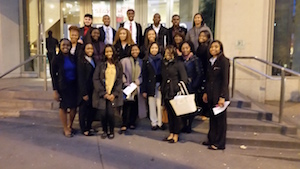
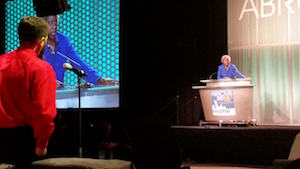
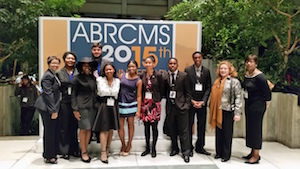
Now celebrating its anniversary year, the Annual Biomedical Research Conference for Minority Students (ABRCMS) is one of the largest, professional conferences for underrepresented minority students and students with disabilities to pursue advanced training in science, technology, engineering and mathematics (STEM). The 2015 ABRCMS conference that was held in November in Seattle, Washington and attracted over 4,000 registered individuals, including undergraduate students, graduate students and postdoctoral scientists, faculty, program directors, and administrators. Students attended from over 350 universities across the United States. These colleges include HBCUs, Hispanic Serving Institutions, Ivy League universities, and other elite institutions.
The conference is designed to provide professional development training for underrepresented minority students interested in pursuing advanced training in STEM and provide faculty mentors and advisors with resources for facilitating students' success. More than 500 representatives from graduate programs at US colleges and universities, as well as scientists from government agencies, foundations, and professional scientific societies join ABRCMS in the exhibitors program to share information about graduate school and summer internship opportunities. During the conference, students participate in poster and oral presentations in 12 disciplines in the biomedical, behavioral, and social sciences.
ABRCMS is sponsored by the National Institute of General Medical Sciences (NIGMS) Division of Training, Workforce Development, and Diversity (TWD), and it is managed by the American Society for Microbiology (ASM).
Distinguished plenary speakers at this year's conference included: Jon R. Lorsch, Ph.D., Director of the National Institute of General Medical Sciences at the National Institutes of Health; Hannah Valantine, M.D., Chief Officer for Scientific Workforce Diversity at the National Institutes of Health; Linda B. Buck, Ph.D., 2004 Nobel Prize laureate, Howard Hughes Medical Institute investigator and a researcher at the Fred Hutchinson Cancer Research Center; Nontombi Naomi Tutu, Human rights activist, the daughter of Archbishop Desmond Tutu, and advocate for social justice; David Quammen, noted author and three-time recipient of the National Magazine Award; and Patricia E. Molina, M.D., Ph.D., President of the American Physiological Society and Richard Ashman Professor and head of the Department of Physiology at the Louisiana State University Health Sciences Center, New Orleans.
Please join us in congratulating SF BUILD Multiple PI, Dr. Kirsten Bibbins-Domingo, on being elected to the National Academy of Medicine. Kirsten Bibbins-Domingo, PhD, MD, MAS is the Lee Goldman, MD Endowed Chair in Medicine and Professor of Medicine and of Epidemiology and Biostatistics. She directs the UCSF Center for Vulnerable Populations at San Francisco General Hospital, a research center focused on discover, innovation, policy and advocacy, and community engagement for communities at risk for poor health and inadequate healthcare.
On Monday, November 16th faculty, staff, students, and members of the community were invited to attend a dialogue addressing the intersectionality of violence, trauma, and health on individual and collective well-being. This event was hosted at SFSU by SF BUILD team leads including Dr. Alicia Fernandez.
Drs. Blake Riggs and Leticia Marquez-Magana co-authored "Near-Peer STEM Mentoring Offers Unexpected Benefits for Mentors from Traditionally Underrepresented Backgrounds, PURM 4.1" published in PURM (Perspectives on Undergraduate Research and Mentoring). Congratulations Drs. Riggs and Marquez-Magana!
"In reflecting on my personal growth as an African American scientist, I was able to succeed in my undergraduate and graduate [sic] by identifying a community in science. Importantly, I found that as a student, when I mentored other students, I had marked gains in my realization that I could be a scientist and ultimately a professor. In researching the topic, I found that there is a lack of studies focused on the positive outcomes of the mentor, most studies instead focus on the mentee. Usually, rationale given for mentoring is mainly for altruistic reasons. In BUMP, I found that my near-peer mentors were becoming more successful and displaying gains in self-efficacy, science identity, and boosting sense of belonging. I believe that if we can say to underrepresented students that if you mentor others, you will see significant gains in your performance in science."
-Blake Riggs, Ph.D., Assistant Professor, Department of Biology, San Francisco State University
"I hope that this paper contributes to reshaping the paradigm that scientists who focus solely on the science are the best at their craft. Instead, our paper, and the work of many others, documents the benefits that "giving back" in science offers to its practice and impact."
-Dr. Leticia Marquez-Magana
SF State Attendees:
NIH Diversity Program Consortium's annual meeting 2015: Dr. Marquez-Magana, Dr. Ben-Zeev, Dr. Mica Estrada, Dr. Alegra Eroy-Reveles, Dr. Tendai Chitewere, Christina Rios, and Jenny Chau
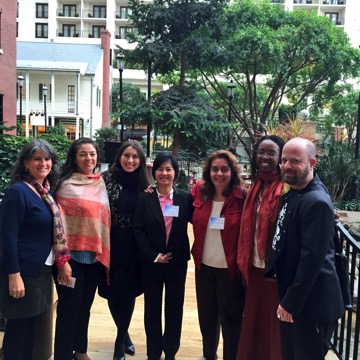
Dr. Mica Estrada, Dr. Alegra Eroy-Reveles, Christina Rios, Jenny Chau, Dr. Leticia Marquez-Magana, Dr. Tendai Chitewere, and Dr. Avi Ben-Zeev
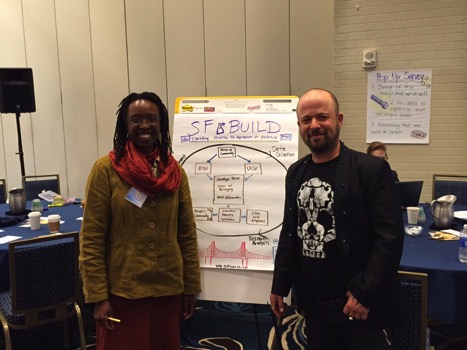
Dr. Tendai Chitewere, Dr. Avi Ben-Zeev
SACNAS: Dr. Leticia Marquez-Magana, Gloriana Trujillo, and Yula Pulay represented SF BUILD at CSU session (described below with titles of individual CSU presentations). Alegra and Tendai attended as faculty participants. Two BUILD Scholars attended.
As part of a national initiative to enhance diversity of the biomedical research workforce the NIH funded three California State University projects. These projects use multiple methodologies to test innovative models for transforming STEM training. The evidence gathered contributes to diversity efforts aimed at strengthening the nation's health-related research workforce.
Panadda Marayoung, PhD, Associate Professor of Engineering, and
Malcolm Finney, PhD, Chair and Professor of Linguistics
California State University Long Beach
An Assets-based and Culturally-congruent Approach to Enhance Student Success through Institutional and Faculty Development in Mentorship and Pedagogical Effectiveness
Gabriela Chavira, PhD, Associate Professor of Psychology, and
Carrie Saetermoe, PhD, Professor of Psychology
California State University Northridge
Blending Psychology and Education: Using Critical Race Theory to Transform the Biomedical Pipeline
Yula Pulay, PhD, Psychology Fellow
Gloriana Trujillo, PhD, Science Education Researcher
San Francisco State University
Using Cognitive Psychology and Science Education to Signal Safety in STEM
At an NIH site visit, BUILD students in the UDM SEAPHAGES course expressed their excitement in successfully isolating their bacteriophages. Above is an image of the phages that were successfully isolated. The 8 groups of students have subsequently named their phages, and are now even more excited about research.
Frank Dawson is the Associate Dean of Career Technical Education, and a former Professor and Chair of the Communication and Media Studies Department at Santa Monica College (SMC). Frank is also a producer, writer, and founding partner in NuHouse Media Group, a Company originally formed to develop and produce television projects in association with CBS Entertainment Productions. His experience as a media executive and producer includes serving as Director of Comedy Development at Universal Television, and as Director of Programming. He also served as Universal's production executive on the NBC dramatic series, "Miami Vice". As a programming executive at CBS, Frank coordinated production of numerous comedy and drama television series. As a partner in the independent company "2002 Communications", he was a producer of Tavis Smiley's first television talk show series pilot, and as Senior Vice President of Television for SI Communications (SI) in Burbank, he supervised all production and development activities of the company in the syndication market, including an innovative sports magazine program that was hosted by "Good Morning America's" Robin Roberts and Fox Sports' James Brown. Frank Dawson was born in New York City, is a member of the Writers Guild of America, and earned his undergraduate degree from Cornell University. He earned a Master of Science degree in Television and Radio from the Newhouse School at Syracuse University, where he has been inducted into the school's professional gallery of distinguished alumni. Frank has also been honored by his prominent inclusion in the book written by Robert Kubey, Director of the Center for Media Studies at Rutgers University, "Celebrating Television: Conversations With People Who Shaped The First 50 Years".
You can click on the link below to read about his recently produced, Agents of Change, which examines the untold story of the racial conditions on college campuses and in the country that led to many protests: http://www.agentsofchangefilm.com/synopsis/


Alison Gammie, Ph.D., is director of the Division of Training, Workforce Development, and Diversity, which supports the Institute's research training, career development and diversity-building activities through a number of programs at the undergraduate, graduate, postdoctoral and faculty levels. Dr. Alison Gammie received a B.A. from Reed College in Biology and a Ph.D. from the Oregon Health & Sciences University. In 1992, she came to Princeton and served as a Jane Coffin Childs postdoctoral fellow for three years and a research scientist for two years. In 1998, she was appointed to a lectureship in the Department of Molecular Biology. In 2004, she was appointed to Senior Lecturer and in that same year was awarded the Princeton University President's Award for Distinguished Teaching. While at Princeton, in addition to teaching, mentoring and research, she served as an academic advisor, an Associate Member at the Cancer Institute of New Jersey, the Director of Diversity Programs & Graduate Recruiting in Molecular and Quantitative & Computational Biology. Prior to joining NIGMS, Dr. Gammie served as a senior lecturer in molecular biology at Princeton University, where she also directed the university's Program for Diversity and Graduate Recruitment in Molecular and Quantitative Biology and its Summer Undergraduate Research Program in Molecular and Quantitative Biology. She was also an associate clinical member at the Cancer Institute of New Jersey. Her research focused on understanding how defects in DNA mismatch repair lead to cancer. Dr. Gammie earned a B.A. in biology from Reed College and a Ph.D. in molecular biology from Oregon Health Sciences University. She conducted postdoctoral research at Princeton University. Dr. Gammie is the media contact for research training, workforce development and diversity programs. Dr. Gammie is dedicated to increasing the representation of women and minorities in the biomedical science. Accordingly, 86% of her former research students are women and 38% are under-represented minorities. In 2013, she received Princeton's Graduate Mentoring Award and the American Society for Microbiology Hinton Award for advancing the research careers of under-represented minorities
Donna Ginther, PhD., is a Professor of Economics and the Director of the Center for Science Technology & Economic Policy at the Institute for Policy & Social Research at the University of Kansas. Her major fields of study are scientific labor markets, gender differences in employment outcomes, wage inequality, scientific entrepreneurship, and children's educational attainments. Dr. Ginther has published in several journals, including Science, Journal of the American Statistical Association, Journal of Economic Perspectives, Demography, and the Papers and Proceedings of the American Economic Association. One of her well known publication in the Diversity Program Consortium is a 2011 study on "Race, Ethnicity, and NIH Research Awards," (the "Ginther report") which concluded that the likelihood that black applicants would be awarded National Institutes of Health (NIH) research funding was 10 percentage points below whites. This report has stimulated tremendous discussion in many sectors, led to conversations within NIH leadership on the need for renewed efforts to increase diversity in our nation's biomedical research workforce, and afforded SACNAS an opportunity to address NIH on these critical issues. She has also received research funding from the National Science Foundation, the National Institutes of Health, the Alfred P. Sloan Foundation and the Ewing Marion Kauffman Foundation. Her research has been featured in several media outlets including the Economist, New York Times, Washington Post, USA Today, NPR, and the Boston Globe.


Jon R. Lorsch, Ph.D., became the director of the National Institute of General Medical Sciences (NIGMS) in August 2013. In this position, Lorsch oversees the Institute's $2.366 billion budget, which supports basic research that increases understanding of biological processes and lays the foundation for advances in disease diagnosis, treatment and prevention. Lorsch came to NIGMS from the Johns Hopkins University School of Medicine, where he was a professor in the Department of Biophysics and Biophysical Chemistry. He joined the Johns Hopkins faculty in 1999 and became a full professor in 2009. A leader in RNA biology, Lorsch studies the initiation of translation, a major step in controlling how genes are expressed. Lorsch is as passionate about education as he is about research. During his tenure at Johns Hopkins, he worked to reform the curricula for graduate and medical education, spearheaded the development of the Center for Innovation in Graduate Biomedical Education, and launched a program offering summer research experiences to local high school students, many from groups that are underrepresented in the biomedical sciences. In addition, he advised dozens of undergraduate and graduate students and postdoctoral fellows. Lorsch is the author of more than 80 peer-reviewed research articles, book chapters and other papers. He has also been the editor of six volumes of Methods in Enzymology and a reviewer for numerous scientific journals. He has two patents related to his translation research. His honors also include six teaching awards from Johns Hopkins. This year Dr. Lorsch was keynote to the SACNAS, ABRCMS, and Diversity Consortium Annual Conferences. In his remarks he provided the lessons he learned from his own mentors to scientists across the training spectrum, from undergraduate students, early careerist, to faculty and leaders in biomedical science. Below is a brief summary of the golden nuggets he shared.
Michael Quinn Patton, Ph.D., is former president of the American Evaluation Association (AEA) and author of six major evaluation books including Utilization-Focused Evaluation (4th ed., 2008), Qualitative Research and Evaluation Methods (4th ed., 2015), and Developmental Evaluation: Applying Systems Thinking and Complexity Concepts to Enhance Innovation and Use (2011). He directs an organizational development consulting practice based in St. Paul, Minnesota. Patton is also a professor with the Union Institute & University Graduate School, a nontraditional university offering interdisciplinary doctoral degrees in applied fields. Prior to his current pursuits, Dr. Patton had an 18-year career on the faculty at the University of Minnesota. He is the recipient of numerous evaluation awards and served as president of the American Evaluation Association in 1988. Dr. Patton has a Ph.D. in Organizational Development and Sociology from the University of Wisconsin. He has conducted applied research and evaluation on a broad range of issues, including antipoverty initiatives, leadership development, education at all levels, human services, the environment, public health, medical education, employment training, agricultural extension, arts, criminal justice, mental health, transportation, diversity initiatives, international development, community development, systems change, policy effectiveness, managing for results, performance indicators, and effective governance. He has worked with organizations and programs at the international, national, state, provincial, and local levels and with philanthropic, not-for-profit, private sector, international agency, and government programs. In regards to his personal life, he has three children-a musician, an engineer, and a nonprofit organization development and evaluation specialist-and one granddaughter. When not evaluating, he enjoys exploring the woods and rivers of Minnesota with his partner, Jean-kayaking, cross-country skiing, and snowshoeing-and occasionally hiking in the Grand Canyon. He enjoys watching the seasons change from his office overlooking the Mississippi River in Saint Paul, Minnesota.


Hannah Valantine, M.D., is the National Institutes of Health (NIH) inaugural Chief Officer for Scientific Workforce Diversity, and a Senior Investigator in the Intramural Research Program at NHLBI. Prior to starting this position in April 2014, Dr. Valantine was Professor of Cardiovascular Medicine and the Senior Associate Dean for Diversity and Leadership at the Stanford University School of Medicine (CA), a leadership position she held since November 2004. While at Stanford, she also pioneered the Academic Biomedical Career Customization model to better align the academic workplace with the needs of faculty in the twenty-first century, for which Stanford gained national recognition as the recipient of the Alfred P. Sloan Award for Faculty Career Flexibility.
Dr. Valantine has been the recipient of several research grants from the NIH and AHA, and has authored over 160 peer-reviewed publications in high impact journals including NEJM, PNAS, Cell, Science Translational Medicine, Circulation, Transplantation, Journal of Heart & Lung Transplant, 10 book chapters, and has been invited to be a presenter at over 100 lectures. She has served on many editorial boards including Journal of Heart & Lung Transplant, Transplantation and Circulation. The following link is to a letter where Dr. Hannah Valentine discusses her experiences and inspiration within workforce diversity.
"My life experiences - from moving from the Gambia to the United Kingdom as a young girl, through my time in London at university and medical school as a young cardiologist, to my time as a professor and associate dean of diversity at Stanford School of Medicine - have indelibly shaped my views on the broad value of diversity. My career has given me a unique perspective, which I am eager to share, toward viewing scientific workforce diversity as an opportunity for achieving research excellence that turns discovery into health for all Americans. Put quite simply, diversity invites innovation. At its center is difference, not sameness, which encourages a broad palette of solutions for the complexity of health challenges before us. I believe that we must keep science top of mind as we pursue strategies to increase diversity in science. The complexity inherent in diversifying the research workforce underscores the need for a rigorous scientific approach, consistent with the ways we address the challenges of science discovery and translation to human health. It is imperative that we solidify scientific workforce diversity as a field of inquiry. We need to also keep in mind that scientific workforce diversity lives within a large ecosystem comprised of many parts. Everyone can contribute to this learning opportunity, and so NIH must provide funding, coordination, oversight, and evaluation such that inclusion and consideration of diversity are incorporated in all institutional processes. Since people, programs, and institutions reside in highly contextual environments, there is no question that a sustainable national scientific workforce diversity strategy is needed to create seamless transitions for biomedical career progression and advancement, toward ensuring that we retain diverse talent in the top echelons of science leadership. I invite you to join me in this journey to establish NIH as the national workforce diversity leader. Imagine the outcomes we can achieve by widening and deepening our ways of thinking and practice. Let's encourage innovative, science-driven thinking to transform diversity from a problem into an opportunity, such that we reach new levels of inquiry made possible with the wisdom of a diverse crowd of thinkers."
Annual Meeting
The CEC coordinated and facilitated the Consortium's Annual Meeting on behalf of the Executive Steering Committee. This year's theme was "Opening Doors: Enhancing the Diversity of the Biomedical Think Force". The Consortium's Annual Meeting was a two day event hosted at the Gaylord Hotel & Resort in National Harbor, Maryland. The event included six Keynote speakers and over 100 attendees representing each Consortium site and the National Institutes of Health (NIH) leadership. Learn more about the Keynote speakers by visiting the "People in Biomedicine" section of this newsletter. During the two day event there were plenary and breakout sessions highlighting the successes of each site, discussing strategies for moving forward as a consortium, maximizing the impact of each site's interventions, discussing how to make evaluation a practical guide to make it "work for you", and learn about preliminary findings "Five years after the Ginther Report". Attendees also had an opportunity to preview a documentary on "the untold story of the crossroads of change and controversy around the racial conditions and the civil rights movement on college campuses in the late 1960's and early 1970's" followed by a discussion with the producer of the documentary, Frank Dawson. Copies of the approved PowerPoint presentations are available to the Consortium via the Intranet.
As a result of the conversations during the Annual Meeting, the CEC is working on general operations redesign that will improve collaboration across sites and facilitate communication for students, faculty, staff, and leadership. An example of this effort includes the inception of the Implementation Working Group, which is a fusion of the Data and Evaluation Working Groups. Details on this were provided to sites and are available on the Intranet.
We would like to thank every site and their leadership for making the Annual Meeting a success. The CEC is currently analyzing the evaluation forms and plans to share the report with consortium sites in the near future.
SACNAS
The Society for the Advancement of Native Americans and Chicanas in Science (SACNAS) also held its annual conference at National Harbor, Maryland in October. Three BUILD programs (CSULB, CSUN, and SF State) presented together at SACNAS on the interventions they are leading at their sites as part of this initiative. This year the conference was sponsored and had representation from over 17 government agencies, which included the Central Intelligence Agency, Federal Bureau of Investigation, and National Security Agency, to name a few. Students had an opportunity to speak with representatives of those government agencies and learn more about opportunities with the government as scientists.
Next year's SACNAS conference will be held in Long Beach, California from October 13th to 15th, 2016. Make sure to save the date!
ABRCMS
The Annual Biomedical Research Conference for Minority Students (ABRCMS) held its annual conference in Seattle, Washington in November. Three BUILD programs (CSULB, Morgan State, and Xavier) had a total of over 50 students represented at ABRCMS. For many of them this was the first time attending a national student conference and presenting their research. Many students were able to share thoughts on the importance of tolerance, diversity, inclusion, and human rights with Nontombi Naomi Tutu, daughter of Archbishop Desmond Tutu, who was the closing speaker at the conference.
Next year's ABRCMS conference will be held in Tampa, Florida from November 9th to 16th, 2016. Save the date!
We thank the National Research Mentoring Network, the Coordination and Evaluation Center, and the NIH representatives for attending both conferences, and all BUILD sites for their outstanding work and attendance at one or both conferences.
Congratulations to the students who received student presentation awards. Great work! You make us all very proud!
During the ABRCMS conference, attendees were devastated to learn of the tragic events that occurred in Paris on November 13th. One of the casualties to the attack was a CSULB student (not a BUILD scholar) who was studying abroad. Our deepest condolences to the families of those affected by the tragedy and to the CSULB community.
Communication Working Group (Comm WG)
The Consortium wide Communications WG convened their second meeting the 2nd week of November. Members of the Comm WG are developing the Consortium Wide logo that will be adopted by all sites as part of our branding strategy. The Comm WG is also resuming the Webinar Series the first Friday of every month at 10am PST/1pm EST effective January 8th. Details are available on the Intranet's calendar. The Comm WG invites everyone to submit proposals for topics of discussion for the webinar series to their site's Comm WG representative.
Data Sharing Agreement (DSA)
The DSA has gone through multiple revisions and the near final version is currently under review by the Executive Steering Committee. In the meantime, program managers can review the draft version to serve as a guide for their Institutional Review Board (IRB) applications.
Executive Steering Committee (ESC)
The Executive Steering Committee (ESC) has elected Dr. Lourdes Echegoyen, from the University of Texas El Paso, as the co-chair of the ESC. The ESC met at the Annual Meeting and has been working on developing and revising policies and protocols related to publications, leadership, and data sharing. We would like to thank the ESC for playing a key role in the Annual Meeting planning and presentations.
"Brown University plans to invest $100 million over the next 10 years to promote campus diversity and combat racism, according to the head of the Ivy League college..." - Brown University will invest $100 million on plan to address racism on campus
"Seven California State University, Long Beach (CSULB) students were recognized in Seattle, Wash., this past week for their juried research presentations, which were part of the 15th Annual Biomedical Research Conference for Minority Scientists (ABRCMS), sponsored by the National Institute for General Medical Sciences (NIGMS)..." - Seven Cal State Long Beach Students Honored at National Research Conference
"Faculty and student researchers at the state's 23 California State University campuses have for decades broken ground in basic and applied science to provide fingertip experience for future fields... Now the nation's largest four-year university system tasked with educating the state's future workforce is ramping up to expand its research...One such campus will likely be Cal State Northridge, the largest in the state. Last year, the San Fernando Valley university saw a 4.5 percent increase in research and sponsored projects -- its $32 million in grants nearly double the awards of five years earlier. That included a record $22 million grant from the National Institutes of Health to provide research opportunities to traditionally underrepresented students." - CSU school system ramping up to expand its research
Morgan State Leads With Its Values in Wake of Protests: "David Wilson, president of Morgan State University, says the protests in Baltimore, following the death of Freddie Gray, gave the institution an opportunity to help the city heal..." Morgan State Leads With Its Values in Wake of Protests
Several years ago, two Black doctors-Dr. Kameron Matthews and Dr. Alden Landry-launched Tour for Diversity in Medicine, a grassroots organization that puts 15 to 20 top minority doctors on a bus and makes a trek across the country to talk to high school and college students about medical school and the medical profession. They also receive mentorship and tips on how to study for the MCAT. The tour kicked off [in October and included] stops at institutions like Portland State University and the University of Washington. Since 2011, the doctors have engaged with more than 2,000 students..." - Latest Medical Schools Data Show Increases in Applications, Enrollment of Minorities
"Alaska is awash in minority populations, from rural students who have a markedly different education experience than their city-dwelling peers to the Alaska Native population. Proportionally, very few of those minorities end up in the biomedical fields, researchers report, and that's a problem, especially in places so dramatically impacted by changes such as climate change. But campuses around the state hope to change that thanks in part to a $23.8 million, five-year award from the National Institutes of Health... With this funding, undergraduate research programs and opportunities will be enhanced throughout Alaska. The money will go to programs at University of Alaska Fairbanks as well as nine rural Alaska campuses..."$23.8M award will fund biomedical education for rural and minority students in Alaska
"With the backing of the NIH funding, Wayne State University (WSU), University of Detroit Mercy (UDM), Marygrove College, and the Wayne County Community College District(WCCCD) will implement the Research Enhancement for Building Infrastructure Leading to Diversity (REBUILD) program." The REBUILD program will "reach out to metro Detroit public schools - particularly Detroit Public Schools - and ask students to apply to the program... They can take classes at any of the four institutions, and it all counts the same. The idea is to get them to pursue graduate degrees and a career in biomedical research. We want to take the mystery out of it..."$21M NIH Grant Will Help Detroit Colleges Improve STEM Diversity
"A new Faculty Diversity Initiative announced by Johns Hopkins leadership seeks to support more expansive and inclusive faculty searches, create a pipeline of diverse scholars, and broaden support for underrepresented members of the faculty..."Johns Hopkins announces Faculty Diversity Initiative
The NIH Diversity Program Consortium (DPC) Newsletter is intended to provide updates and announcements from DPC team members, highlight news related to diversity and professionals from underrepresented backgrounds in biomedical science, share progress on the collaborative efforts within the Coordination & Evaluation Center at UCLA (CEC) to inform Working Group's achievements, and ultimately serve as the main avenue to DPC-wide communications.
Copyright 2015. All Rights Reserved